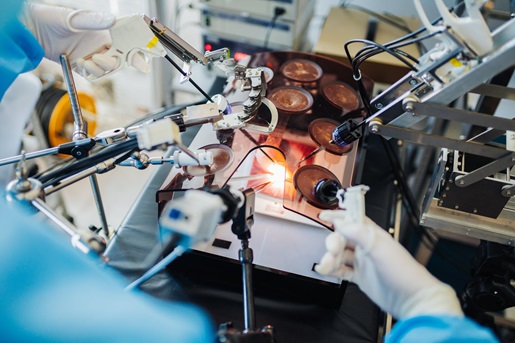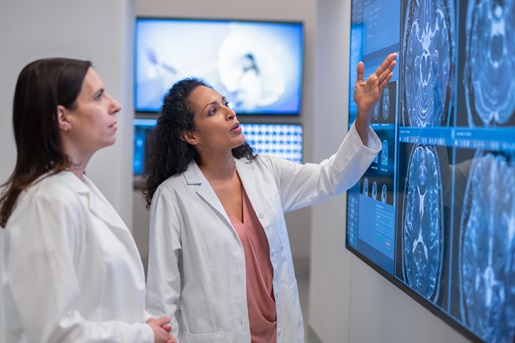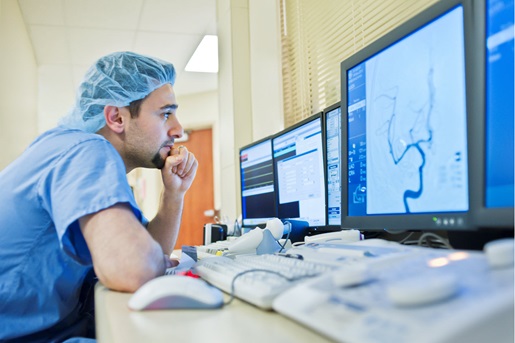The benefits of AI in healthcare extend to managed care, facilities, pharmaceuticals, and medical equipment alike
The benefits of AI in healthcare apply to just about every part of the industry. Whether you work in managed care, facilities, pharmaceuticals, or medical equipment, integrating AI into your operations can streamline your workload and help improve patient outcomes. Some medical AI technologies go back decades, while others are still in their early stages. Almost all of them, however, have evolved by leaps and bounds in the last few years, thanks to advances in software, hardware, and cloud computing.
Just like any other novel technology, AI offers challenges as well as opportunities. Implementing high-quality AI procedures requires time, money, and specialized knowledge. Experts are also still debating the ethics of AI in healthcare, which may have profound implications for the medical field.
Even so, AI has the potential to transform healthcare for the better. Read on to learn how four medical fields have already benefited from AI integration.
Need help picking the right scanner for your transition to AI-powered healthcare? Check out our post, AI in Healthcare: The Complete Guide.
Overall benefits of AI in healthcare
To reap the benefit of AI in healthcare, it's helpful to understand just how broad the technology can be. "Artificial intelligence" can cover everything from collating data, to analyzing patterns, to imitating human speech. All of these applications are already present in the healthcare industry.
In general, AI programs can benefit any part of the healthcare industry that deals with large quantities of repetitive data. The specific pros and cons of AI in healthcare vary from field to field.
Benefits of AI in managed care
Assisted diagnosis is one of AI's most important applications in the healthcare field. Today, medical AIs can cross-reference vital signs, lab tests, medical images, and patient history to assist healthcare providers in identifying and diagnosing diseases more accurately and quickly. Similar AI programs can also recommend full treatment courses. Unlike human clinicians, AIs can work through this data for dozens of patients at a time.
The huge caveat here is that doctors, nurses and other providers still need to have final say. While AIs are generally comprehensive and accurate, they're not infallible. The most likely diagnosis is not always the correct one, and a human being — not a computer program — must ultimately take responsibility for a patient's wellness.
Did You Know?:The fi-8170 can scan up to 70 pages per minute and 10,000 pages per day. Click here to learn more.
Benefits of AI in healthcare facilities
All healthcare facilities require some level of bureaucracy to run. The benefits of AI in healthcare are evident for many clerical tasks.
AI chatbots have been a staple of the Internet since the late '90s, but they started off as "just-for-fun" projects. Now, about one-quarter of customer service firms use chatbots, including many companies in the medical industry. Chatbots can answer questions, collect data, and even schedule appointments for patients. That means less time on the phone for front-office staff, and less time manually sorting through paperwork. AI programs can also help deal with insurance claims.
Regardless of how refined your AI options become, though, you should still make it easy for patients (and insurance reps) to talk to a real person. Not every patient is comfortable entrusting sensitive information to an AI.
Furthermore, you should test your chatbot now and then to make sure it's fielding inquiries correctly. Generative AIs also have a bad tendency to "hallucinate," which means a patient could wind up with inaccurate information.
Benefits of AI in pharmaceuticals
Discussing the benefits of AI in pharmaceuticals could easily be a whole article on its own. One intriguing study comes from the scientific journal Artificial Intelligence Review. The piece proposed 11 different ways for AI to enhance pharmaceutical research. These include everything from modeling protein folding, to analyzing clinical trials, to finding secondary uses for existing drugs.
Due to the pharmaceutical field's size and diversity, the challenges of AI in healthcare are difficult to gauge. Drug testing already employs rigorous safeguards, which AI would probably not affect. However, health records, such as patient information gathered during clinical trials, are vulnerable to data breaches – making cybersecurity doubly important.
Did You Know?:The RICOH fi-8170 is a 2023 Future of Work Product of the Year Award winner, recognized as one of the “most innovative and disruptive products and solutions that have positively supported hybrid work experiences across the globe.” Learn more here.
Benefits of AI in medical equipment
Medical imaging provides a clear example of AI taking on tasks that humans would find nearly impossible. By parsing thousands of patient images, AIs can now predict certain types of cancer more accurately than human pathologists. That's because AIs can analyze massive amounts of data with perfect recall, and pick up on subtle patterns that few humans would be able to identify.
As with most other AI applications in healthcare, human oversight is vital here. Naturally, humans need to verify AI diagnoses and approve AI-generated treatment plans. But human clinicians may also need to trust a little more in reliable AI tools. Right now, doctors don't always trust the technology — even when it's accurate.
While AI image analysis programs are widely available, you'll need to have digitized medical images and records to get the most out of them. Learn more about how Ricoh has helped healthcare companies create comprehensive electronic medical records.
Ethical considerations of AI in healthcare
Right now, there is no comprehensive legal framework for medical AI in the United States. That will change within the next few years, though. In October 2023, President Joe Biden signed an executive order that calls for national standards in AI regulation. The document calls for "responsible use of AI in healthcare," but there are no specifics beyond that yet.
For the time being, clinicians will have to rely on local laws and their own best judgment. The UNESCO "Recommendations on the Ethics of Artificial Intelligence" may be a good place to start. At the very least, be transparent about your use of AI, and provide patients with as much information as possible.
Our recommendation: RICOH fi-8170
Those who want to explore the benefits of AI in healthcare through digitization have no shortage of options. We take great pride in having spent the last 50+ years researching, designing, and developing some of the most advanced and powerful electronics in the world, including our professional grade fi and SP series of scanners.
Built to purpose for the most demanding document handling jobs, fi and SP scanners are capable of processing tens of thousands of pages per day at the highest levels of accuracy. Their intuitive integration capabilities with all existing work suites minimize time-to-value for businesses looking to invest in tools that will pay dividends for years to come.
The RICOH fi-8170 scanner is a smart choice if you have medical records to scan, organize, and analyze. This device can scan up to 70 pages per minute, with a resolution of 600 dots per inch. At 11.8 x 6.7 x 6.4 inches, the fi-8170 fits easily on most desks, and it weighs less than 9 pounds, for easy relocation. The PaperStream Capture software can easily digitize any information on the sheet. Click here to learn more or shop the rest of our production scanner line.
Note: Information and external links are provided for your convenience and for educational purposes only, and shall not be construed, or relied upon, as legal or financial advice. PFU America, Inc. makes no representations about the contents, features, or specifications on such third-party sites, software, and/or offerings (collectively “Third-Party Offerings”) and shall not be responsible for any loss or damage that may arise from your use of such Third-Party Offerings. Please consult with a licensed professional regarding your specific situation as regulations may be subject to change.









